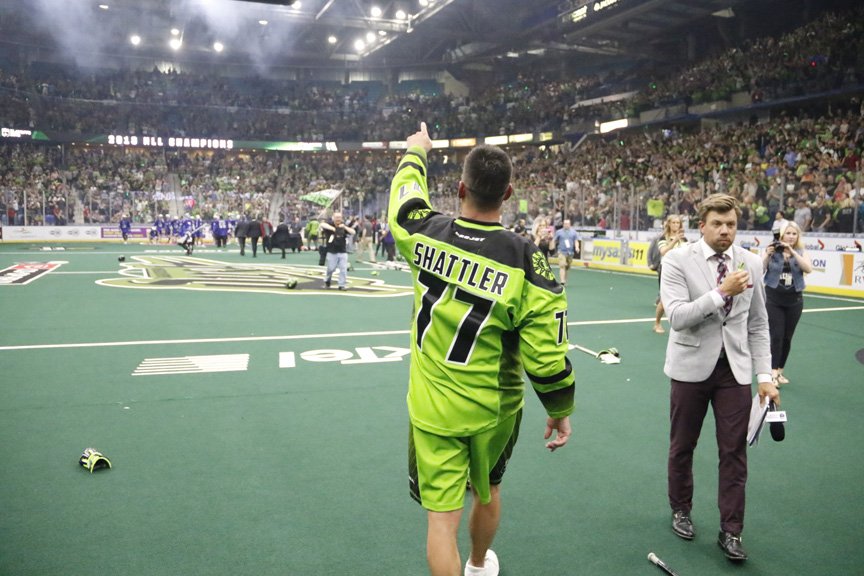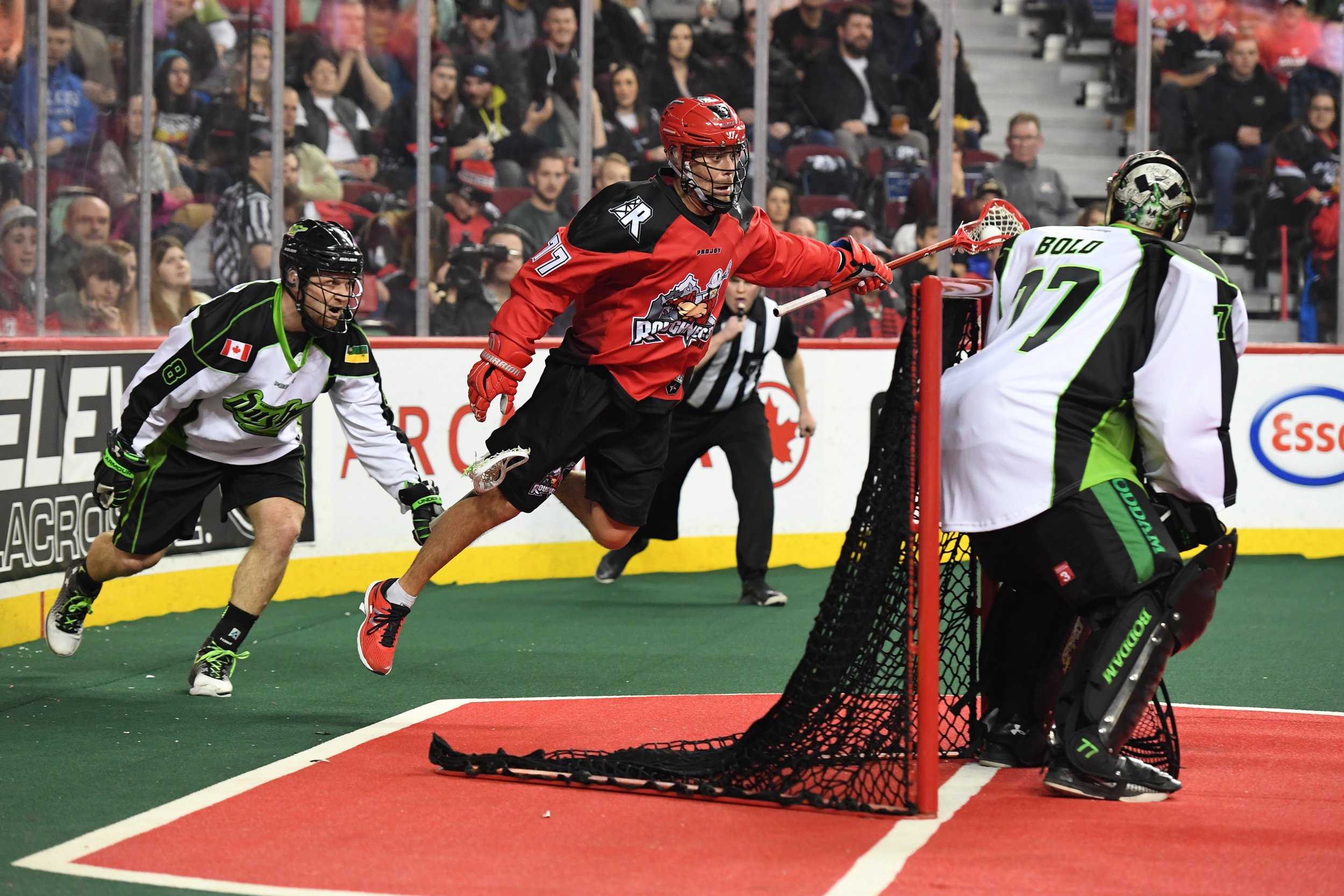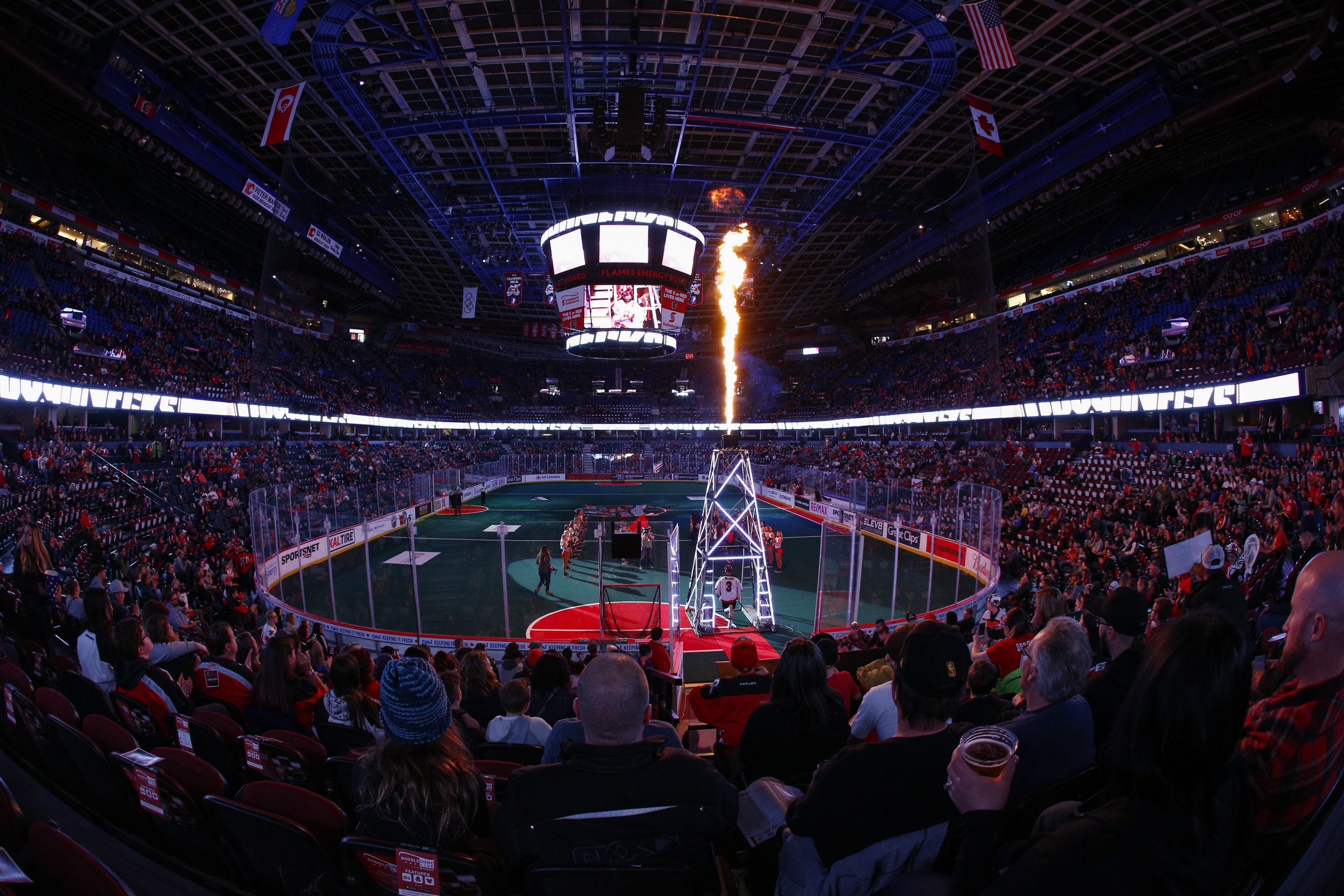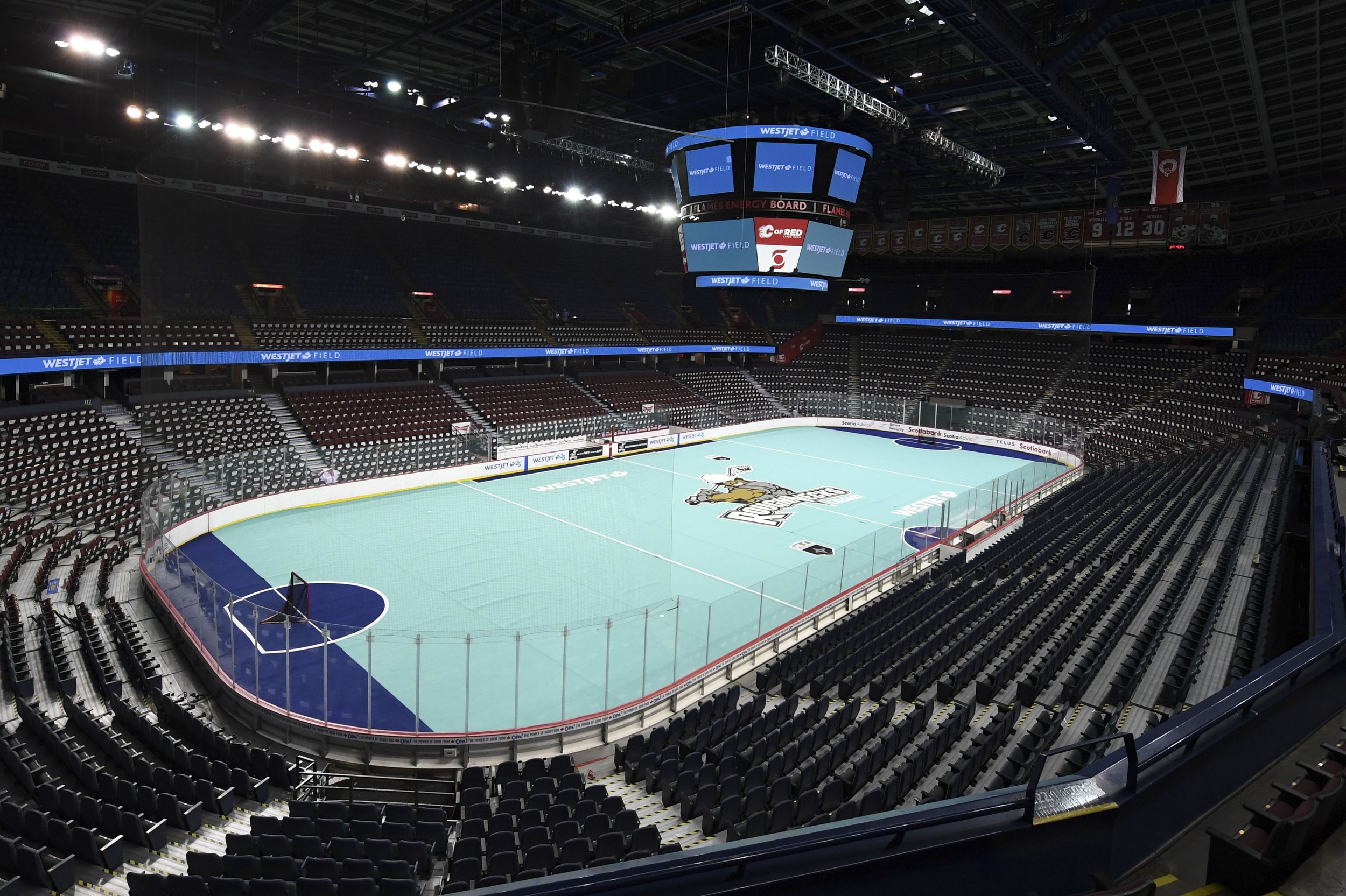Jeff Shattler: What a Rush
PHOTO: COLLEEN GRIMES
In the weeks leading up to the 2021/22 National Lacrosse League season, Jeff Shattler confirmed, this will in fact be his last year playing professional lacrosse.
A Transition Player of the Year winner, an NLL MVP, a post-season series MVP, and a champion with both the Calgary Roughnecks & Saskatchewan Rush, few have experienced the success in the sport similar to how Shattler has attained it.
When Shattler was named the league’s top player in 2011, then-Roughnecks owner, Brad Banister, said, “Jeff has become the type of player that we can trust in any position on the floor, in any situation of the game…and at age 26 he still has his best lacrosse ahead of him.”
Since then, Shattler has produced at a pace that has propelled him to all-time status (see his surreal stat collection in the TLM Top 100) and has granted him the right to leave this league on his own terms.
While preparing for his final ride with the Rush, The Lax Mag sat down with Shattler to reflect on a career that started as a shock, should easily land him in the Hall of Fame, and could very well end with another Cup.
TLM: After getting traded from Mississauga to Brampton back in the summer of 2004, you really elevated your game. What do you attribute that to?
Jeff: With Mississauga, I was still playing hockey, and that was my main focus. I was playing OHL hockey with the London Knights and then also spending my summer playing lacrosse for the Mississauga Tomahawks. The Tommies were an awful team those years. Like we were one of the worst squads in the history of the league (TLM: Mississauga went 0-20 in 2004). I sort of lost my love for the game from losing constantly that summer.
And then when I went to play with the Knights, I blew my shoulder out and that kind of ended my hopes with hockey. When I came back to lacrosse, my buddy, Scott Gillingham, got me a trade over to Brampton to go play with him. I started having fun again. I started dedicating myself more and more to the game. Troy Cordingley saw me and brought me on to the Brampton Excelsiors Senior team, and the rest is history.
TLM: At that point, you were starting to generate interest leading up to the 2005 NLL Entry Draft. Was being drafted something you dreamed of?
Jeff: I'll tell you the truth, I honestly didn't think anything of it. I knew I was going to play Senior ‘A’. I watched the NLL, obviously, living in Toronto going down to the ACC and back in the days at Maple Leaf Gardens, but I never really thought of it to be honest.
Troy, who was with the Buffalo Bandits, told me, “We're going to draft you in the first round." And when he said that, I was kind of blown away, grateful, but totally caught off guard. It was a great opportunity, but Buffalo was so stacked those years. I never got to play. I learned from a lot of good players, but I think my career started turning for the better when I got traded to Calgary.
TLM: In Calgary, you debuted as a transition player, back when the term was just starting to get used in the league. How do you define the position of transition?
Jeff: I think that position means security. There's a lot of good offensive players out there. There's always going to be a better player than you, offensively and defensively too. There's a lot of skilled defensive players, but if you could contribute on both sides, it makes it very hard for you to be cut. If you give everything you got, you can run the ball, you can get loose balls, you can score goals, you can play defense, you can back check; if you can do it all, you'll have a bright career.
I think a transitional player is all about work ethic. It's all about giving everything you’ve got. I remember earlier in my career, yeah, I was all defense. I was willing to play whatever position it took for me to play in the NLL. I could get the ball and I could run. And that's what I did. I tried to prove myself that way. And then over the years, I started putting more and more numbers up as a defensive player. I think I played defense out the back door my first five or six years of the NLL, which is pretty crazy when I think back, because that feels like a lifetime ago. Not so much anymore, I don’t have the wheels for it, but back then, I really always prided myself on being able to play every position.
TLM: In 2011, you had one of the most unique seasons ever in the NLL, winning both the Transition Player of the Year Award and league MVP. What was the secret to that season’s success?
Jeff: We just had a really good season. We always finished one or two in the west. I did play out the back door and I did put up a lot of numbers running the ball up. And I believe it was at game six, maybe seven, they had me going out the front door and tracking back because a lot of teams were running on us. I was basically the guy that was between the lines that would make sure we maintained the play and dictated pace. It was exhausting. The league didn’t track time on floor like they do now, but man, that season I was playing at like four and five minutes at a time. It was an eye opener to see what I was capable of doing. So, I was playing defense, offense, and kind of doing everything in between that year.
TLM: At the NLL level, we’ve seen the game evolve over the years. When the league first started, every player played full floor. When more Canadians crashed the NLL, it got very O/D specialized. Now we see more players, who like you, are so dominant on both sides of center. Where do you see NLL gameplay going?
Jeff: I think at a Junior level or lower, every kid should, up to a certain point, play every position. Because, if you develop a kid that can play good offense/defense, when they get drafted to a pro team, there's a good chance that they're not looking for just an offensive player. It’s so hard to take one of those top five goal-scorer spots. Most teams often don't really need one of those, but they’ll always need someone to push the ball and score. I think that makes you more of a threat.
You’ll always need guys that play strictly offense and defense in this league though. I don’t think we’ll go away from that. But, I think the transition role is critical in today’s game, especially with how fast the game has become.
TLM: You moved from one iconic Canadian NLL franchise to another, about to start your fourth season with the Saskatchewan Rush. Was it difficult to leave Calgary for Saskatoon?
Jeff: In many ways, Calgary is home for me. I honestly didn't want to leave when the time came. I was a free agent. The offer that they offered me, it was almost like an offer that they didn't want me on the team anymore. It hurt. From the players to the fans, the Roughnecks organization was like a family back then. I wasn't done, I wasn't ready to leave, but I could just see behind the scenes that, all right, maybe it is time for me to go.
When Brad Banister, who I was really, really tight with, no longer owned the team, things changed. There was a lot of tension there I could see, but he had done a lot for the Calgary franchise. He was gone and a lot of my buddies had retired. I talked to my wife about what they were offering and what would be best for us. I didn’t know if it was worth it anymore.
I was actually visiting Brad at his cottage. He was good buddies with the Rush’s owner at the time, Bruce Urban. They were on the phone, and Bruce said, “I heard Jeff is a free agent now,” and Brad replied, “Sure is, and he’s sitting here right beside me!” I talked to Bruce, had a great conversation, we came up with an agreement, and just like that I was Saskatchewan Rush property.
TLM: Any hard feelings towards the Roughnecks?
Jeff: I loved playing in Calgary, and now I love playing in Saskatchewan. I love going back to Calgary and playing there. I love all the boys, I love the coaching staff, and that goes for both teams. But this is pro sports, right? That's the way it is. There are no hard feelings there, but it was just at the time, I was a little bit hurt, sure.
You see guys that play for like 13 teams, and I was lucky enough to play for two – Buffalo doesn’t really count, I played all of one game there. When people ask, I played for the Calgary Roughnecks and I play for the Saskatchewan Rush. You get traded and that's the way it works. No hard feelings.
TLM: Last Calgary question… you dig the new Calgary colours?
Jeff: That's the black, eh?
TLM: Yep.
Jeff: I think it's all right. The red was pretty iconic for them, but I don’t mind the black. Maybe go with like a matte black helmet, get some chrome going on there. But the old uniforms were always ... I thought they were brilliant. And I do love flying WestJet, don’t get me wrong, but guess I have to get used to that new turf still.
TLM: Not only do you now play for the Rush, you moved to Saskatchewan too. What’s kept you there year round?
Jeff: I was here for about a year. I started doing some coaching, and quickly saw, there were no camps being done or many great opportunities for kids to play the sport at a level I was used to seeing. And I could see there were a lot of kids looking to play. There was a real demand and hunger for the sport. So, I thought about it, took a shot in the dark, and started the Shattler Lacrosse Academy here.
We’re in December right now, and I have bookings going into August already. I'm turning down programs right now just because I can’t keep up with the demand. It’s also the reason why I felt it was the right time to retire from the NLL after this upcoming season. I want to make time for the kids here, for my family too. Hopefully this helps spread the game further in the province.
TLM: There seems to be a lot of similarities with what you’re doing in Saskatchewan and what Geoff Sndier started with ELEV8 Lacrosse in Alberta soon after the Rougnnecks popularity in the province. Alberta lacrosse across the board has seen significant growth since. Do you see that same start happening in Saskatchewan?
Jeff: I do, yes. I don't think it's going to happen right away, but I think there's going to be a lot of grass-roots growth in the next handful of years. I've got some kids in my program that I’m confident will one day play in the NLL. There's a lot of raw talent in this province, and the kids here, they love to listen, they love to learn. We’ve got farm boys that listen and are really polite. They want to learn the game and they want to learn the game the proper way. You need kids that want to learn and want to be there. I’m already seeing that slow but steady growth with the Academy, and I think we're going to see a good success rate here in the next four or five years.
TLM: Derek Keenan stepped into a GM-only role this year. Jeff McComb is far from new to the organization, but much of a difference with him as Rush bench boss?
Jeff: We’re all showing up for one reason… we want to win. I don't think that much has changed that way. Maybe a couple of the drills that we do in practice, and Derek will laugh at that one, but I think that we're all professionals when it comes to this. The team is a little bit different, just because we've lost a lot of our role guys, but sometimes change is good. Jeff is a great coach. I love playing for him. I think we're going to have a dominant year with him leading us. I think we're going to do some damage out there, and have some fun!
TLM: It’s your final year in the league. Expectations for this last ride with the Rush?
Jeff: I just want to enjoy the moment. I want to enjoy being out there, running out on the floor, hearing the crowds, scoring a goal, jumping off the glass, cheering with my buddies, the bus trips, the flights, playing cards, just enjoying the little things that I took for granted before COVID. COVID really made me think about life and all those things that I took for granted. To have an opportunity at the age I'm at to go out there and still battle with my buddies, I'm not going to take anything for granted. I want to have fun; I want to win and do whatever I can in whatever role the coach needs me to play.
So, what are my expectations this year? To do what needs to be done to get Saskatchewan another NLL Cup.







